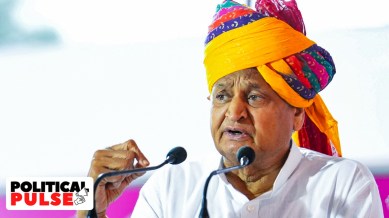Ashok Gehlot looks for ‘magic’ in Rajasthan as his political future hangs in balance
The 3-time CM was banking on welfare schemes to retain power, ensured he was on the job with it since coming to power

With early Rajasthan trends showing the BJP ahead in the state, Chief Minister Ashok Gehlot waits with bated breath as his political future hangs in the balance.
The 72-year-old Gehlot has thrice held the top post in the state but never consecutively, given the state’s trend of voting out the sitting government.
monthly limit of free stories.
with an Express account.
Despite the internal strife within the Rajasthan Congress owing to Gehlot’s tussle with former deputy chief minister Sachin Pilot, the CM left no stone unturned to ensure another term. Taking a leaf out of the BJP’s playbook, Gehlot banked on welfare schemes launched by his government, and a publicity blitzkrieg around them, as his biggest weapons. In a marketing drive for his schemes, he also traversed the length and breadth of the state in recent months.
Gehlot seems to have learnt a lesson from his previous tenure as CM, when the Congress was seen as having failed to capitalise on his government’s free medicine scheme. The course correction this time was evident as early as 2019, within a year of the Congress returning to power.
In his very first budget, Gehlot announced Janata Clinics in order to make healthcare services more accessible, especially to those living in urban areas with a dense population. This seemed to be a direct take off from the Aam Aadmi Party government’s Mohalla Clinics in Delhi.
The next big welfare scheme announcement came in 2021 — the flagship Mukhyamantri Chiranjeevi Health Insurance scheme. While the previous Raje government had run the Bhamashah Health Insurance Scheme that catered to families covered under the National Food Security Act (NFSA), Gehlot said the Chiranjeevi scheme would cover not just NFSA beneficiaries and economically backward sections, but also people from high income groups, in all government hospitals and some private hospitals, by paying just over Rs 800 annually. This was marketed as Gehlot’s universal health coverage plan.
After its introduction, Gehlot increased the Chiranjeevi health insurance cover from Rs 5 lakh to Rs 25 lakh. In its election manifesto, the Congress promised to increase the insurance amount in the Chiranjeevi scheme to Rs. 50 lakh.
Gehlot, who believes one reason for his government’s loss in 2003 was a prolonged protest by government employees, was also quick to bring back the old pension scheme (OPS), before it became a poll issue. The demand has been rising across states, and the BJP paid a price for not heeding to it in Himachal Pradesh, which was won by the Congress.
The magician of Marwar
Son of a magician, Gehlot first became an MP from Jodhpur in 1980 and would go on to win the seat four more times.
Congress veterans in Rajasthan still cite the example of how Gehlot became the chief minister of Rajasthan for the first time in 1998 by edging out senior party leader Parasram Maderna.
The Congress had fought the 1998 Assembly elections with Maderna as its face and according to political analysts, one of the reasons for its landslide victory of more than 150 seats in the Assembly was the fact that the Jat community threw its weight behind the party hoping that Maderna, who was from the community, would get the top post.
Gehlot, whose first stint with the top post coincided with Sonia Gandhi’s elevation as the Congress president, has since then been an indispensable cog in the Congress mechanism in Rajasthan.
From people living in interior villages of Rajasthan to shop owners in Jodhpur, who have known him since his association with the NSUI, marvel at how even as chief minister, he would engage with them casually, discussing matters of daily lives without any sign of arrogance.
Some of the achievements of his three terms as chief minister include securing funds from the Centre for drought-hit Rajasthan to ensure swift relief and implementing the scheme to provide free medicines during his second term.
It was also his ability to reach out to people across party lines that helped the Congress secure the support of six BSP legislators in 2008 to form the government after the party won 96 of the 200 Assembly seats. Later, all the six MLAs joined the Congress.
A similar scenario was witnessed in 2018 as well when several Independent MLAs, mostly Congress rebels, had said they would lend support to the party on the condition that Gehlot becomes the chief minister.
At the Centre, Gehlot has been Union Minister of State for Tourism, Sports, Civil Aviation and Textiles (Independent Charge) in the Indira Gandhi and Rajiv Gandhi governments.
In recent years, Gehlot’s influence in the Congress even outside Rajasthan has increased steadily, and flanked by his loyalists, he has resisted successive attempts at a leadership change in Rajasthan.